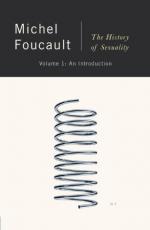
|
| Name: _________________________ | Period: ___________________ |
This test consists of 5 multiple choice questions, 5 short answer questions, and 10 short essay questions.
Multiple Choice Questions
1. Why does Foucault call power "omnipresent?"
(a) Because it follows the pyramid of influence in which all parties feel its effects.
(b) Because it has the priviledge of consolidating everything under its unity.
(c) Because it is produced from one moment to the next at every point.
(d) All of the above.
2. What major transformation in sexuality happened at the turn of the nineteenth century?
(a) Perversions were defined and recognized.
(b) The biological study of sexuality discovered hormones and thus explained perversions medically.
(c) The population openly accepted sexual discourse as necessary for a healthy sexuality.
(d) The focus on sexuality went from everlasting punishment after death to a medical problem of illness in life.
3. Which series formed the solid nucleus of the new technologies of sex?
(a) Perversion-heredity-degenerescence.
(b) Heredity- medicalization-normalcy.
(c) None of the above.
(d) Demography-family-heredity.
4. What does the rule of double conditioning state?
(a) Every power center and resistance have more than influence working upon them.
(b) All local centers enter into an over-all strategy, and no strategy could have effect without support of local centers.
(c) For every power there is a specific resistance.
(d) None of the above.
5. What was the effect of the deployment of alliance in the family unit to control sexuality?
(a) It intensified the situation, then involved outstide help like doctors which caused discourse to increase.
(b) It limited the discussion of sexuality in the family unit and so drove it to outside relations like doctors.
(c) It channeled many of the previously accepted forms of sexuality into new perversions.
(d) None of the above.
Short Answer Questions
1. How did the institutions of power that developed in the Middle Ages, primarily monarchy, make themselves acceptable?
2. What does Foucault say we need to do in order to understand the relationship between sexuality and power?
3. According to Foucault, the role of the family unit is NOT:
4. Who was Charcot?
5. Which of the following statements would Foucault use to describe sexuality?
Short Essay Questions
1. How does Foucault define power? What is it like?
2. Explain what is meant by the statement that sexuality changed from a matter of death and sin to a matter of life and illness.
3. What does Foucault have to say about resistance? Where can you find it?
4. What role does discourse play in power?
5. How does sexuality vary between classes?
6. What does Foucault mean when he refers to the cyclical nature of power and law? Explain.
7. Explain the concept of juridico-discursive power. Where does Foucault say we perceive it to act?
8. How did sexuality spread to the general population?
9. In what form did sexuality first arise, and what was its intended purpose?
10. What is the pedagogization of children's sex?
|
This section contains 1,090 words (approx. 4 pages at 300 words per page) |

|




